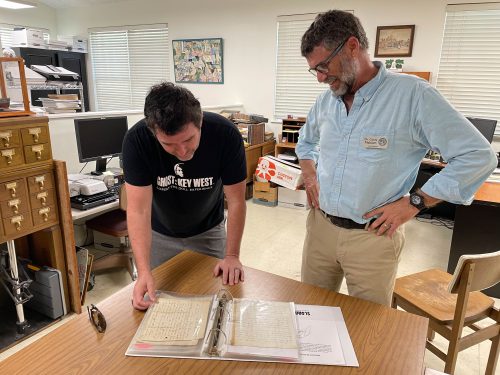Letters Donated To The Florida Keys History Center Open New Window Onto Civil War-Era Key West

Researchers studying the history of the Florida Keys – and the Civil War – will get new insight into life on the island during that time, thanks to the donation by local author David Sloan of a collection of letters from a Union officer.
Sloan, author of numerous books about Keys history and culture, gave 47 letters dating from 1861 to 1865, with 172 total pages, to the Monroe County Public Library’s Florida Keys History Center. The letters are from John Peter Shindel Gobin, who was a captain with the 47th Pennsylvania Infantry Regiment of the Union army. The regiment was stationed in Key West for two different periods during the Civil War.
“This is huge,” said Dr. Corey Malcom, lead historian at the Florida Keys History Center, thanking Sloan for his generosity and foresight. “This really will help change our understanding of Civil War history.”
Sloan acquired the letters after researching the history of his great-great-great-grandfather, David Livingston Sloan, who served in the 47th Pennsylvania. The Gobin letters had been in private hands since the Civil War.
Sloan said he donated them to the FKHC so they would be preserved, and so others could read them.
“This organization is the reason I am in Key West,” he said. In 1996, Sloan had moved to Key West and was researching local lore in order to start a ghost tour. He wasn’t having much luck – until he met Historian Emeritus Tom Hambright, who shared information from the archives.
“I feel I owe my life as it is to the Florida Keys History Center,” said Sloan, the author of “Ghosts of Key West” and owner of Ghost: Key West, which provides tours of the Civil War-era Fort East Martello museum.
Malcom and Sloan said the letters provide invaluable details about daily life on the island during the war, from coping with yellow fever – and boredom at Fort Zachary Taylor – to searching for romance.
“There’s a love story between the lines,” Sloan said. Gobin eventually married a woman he met in Key West. He returned to Pennsylvania after the war and served in the state Senate and, from 1899 to 1903, as lieutenant governor of the state. He died in 1910.
Sloan said he hopes his donation will encourage others who may have documents to consider adding them to the FKHC collection.
Malcom said the FKHC will post the entirety of the letters online, so that researchers everywhere can access them. He expects they will be of great interest to not only historians studying the Keys, but those looking for primary sources from the Civil War.
Here are just two examples from the new collection of letters, which will eventually be posted online for anyone to access.
From March 30, 1862:
From September 10, 1863: